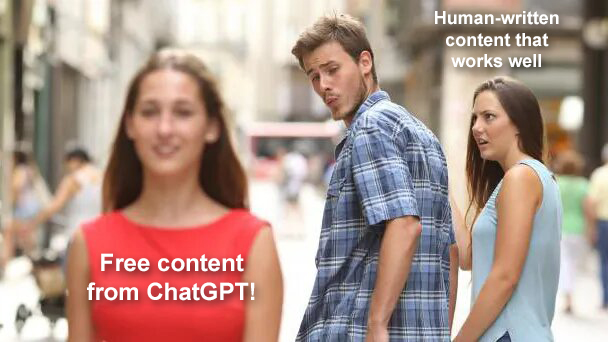UPDATED MARCH 17, 2024
I know the value of SEO content
I’ve been an SEO content writer for 15 years and I truly understand the value of it. I used SEO content to revive my last employer’s business when it was floundering. It’s been my prime marketing strategy as a freelancer. And it’s helped many of my clients to convert more of the customers they want.
Yet so many businesses I talk to don’t use it at all or aren’t using it to its best potential. And I hear the same reasoning behind their decisions all the time.
Why you’re not using SEO content
If you’re on the fence about creating content, I’m hoping this article will change your mind and show you some of the many benefits you can expect.
You think it’s too expensive
The price you’ve been quoted for blog articles seems expensive.
But SEO content shouldn’t be seen as an expense. It’s actually an investment in your business and will be designed to generate returns.
Writing the kind of content your audience wants to read will attract them to your website, where you’ll have the chance to engage them and move them through your customer journey.
Content adds value to your website, too. It creates a resource for your readers while simultaneously building your credibility, authority and trustworthiness. And it will improve your website’s performance on Google.
Good content is expensive for a reason
There’s a lot of work involved in writing the kind of high quality blog articles that will help you convert more of your website visitors into paying customers.
This includes:
- Developing an effective content strategy
- Planning articles that meet the goals of your business
- Researching your ideal customers and what they want
- Formulating an effective SEO keyword strategy
- Tracking down original and credible sources of information
- Writing engaging articles that are interesting and easy to read
- Optimising your articles correctly with all the necessary components
- Comparing and strengthening your articles against your competitors.
The alternative could cost you more
Like many business owners, you may have been swayed by ChatGPT. I mean, it generates content ideas for you and, on the surface, it sounds okay, right?
So surely it will do almost as good a job as a human, but, for free, right?

Err… wrong, actually.
First, because AI-written articles typically don’t get the same traction as human-written content. People are less inclined to want to read them and even less likely to act on them.
And poorly researched, poorly written content isn’t going to win you any fans or convince your audience you really know what you’re talking about.
Second, because Google’s March 2024 core update was designed to search and destroy low-quality AI-written content. Businesses that had published lots of it found their websites had taken a hit.
Some found their content had been de-indexed so it was no longer searchable. Others found their whole websites had been delisted. Trusting ChatGPT to write their content had proved a regrettable and costly mistake.
You’re happy with your current strategy
You already have a strategy that’s working well to generate leads. That might be advertising, cold calling, social media marketing, direct mail or a referral scheme. So why would you complicate things by introducing something else to the mix?
First, since when did it hurt to have more avenues for prospects to find you and buy from you?
Second, by not creating content, you’re not satisfying the needs of your audience.
The point is, content doesn’t take away from what you’re already doing — it adds to it and gives you an even greater chance of success.
Content is important to your prospects
Blog content is a valuable resource for prospects who need information. The more articles you create and the more issues you cover, the more valuable that resource becomes. If you’re able to solve their problems and answer their questions, you’ll be more likely to gain their trust and convert them into paying customers.
If your competitors are creating content, by not doing so yourself you’re putting your business at a disadvantage. Because when your prospects are looking for information, they won’t be finding it from you. And when they need help, you won’t be the first business they call.
Content takes too long to deliver results
Content is a slow-burn and it could take months of consistent effort before you see any results. You don’t see the point of bothering with all that when you could just use paid ads to buy yourself a spot on page one.
If you’ve been used to the snappy returns of advertising, it’s not surprising that you can’t quite see the logic of creating content.
But it’s important to remember that content is a long-term strategy and is about building value for your prospects and your business. So let’s have a look at how content and advertising both differ and complement each other.
SEO content does more than just sell
Advertising is created to sell. It has one function — and that’s it. Nice and simple with immediate returns.
SEO content is multifunctional and can do amazing things for your business behind the scenes, such as:
- Attracting new visitors to your website
- Creating awareness of your brand
- Building an audience of warm leads
- Demonstrating your knowledge and expertise
- Showing your authority in your industry
- Inspiring confidence and trust in your brand
- Promoting your brand values
- Converting visitors into subscribers and buyers.
SEO content brings your audience to you
Advertising has to go out to your audience. You can spend a small fortune on picking up customers by advertising in different places and on different platforms.
And, unlike content, advertising can be ignored. During a typical day, we’re exposed to so many adverts it’s become overwhelming and we’ve developed conscious and unconscious ways of filtering them out. That might be natural, by not paying attention to them, or actively, using tools like ad blockers, skip options and delete buttons.
SEO content brings your audience to you. People look it up to solve their problems, answer their questions, find inspiration and learn new things. And it’s self-promoting, because once people find a great piece of content, they often feel compelled to share it.
SEO content is an investment
Advertising is categorised as an expense. Because when the money stops, the ads stop. And aside from any money you might have made, you’ll have nothing else to show for it.
SEO content is seen as an investment in your business. Once you’ve paid for an article, it’s yours. And it can stay on your website for as long as it’s relevant and helpful. This means it can keep attracting visitors to your site for months, and even years, after it’s published.
You don’t have any ideas for content
Sure, ideas are important for creating great content. But you don’t have to come up with them yourself. You can hire a content strategist for that.
A similar and equally common objection is that you think your industry is too boring for content — but this isn’t true. There’s always something your audience wants to read about. And when it’s written with curiosity and enthusiasm, it should create the same reaction in your reader.
You don’t have time to think about content
You’re running a business and you’re not a writer, so why would you want to spend time thinking about content?
If you have a business to run, there will always be more important things for you to be doing. And these will be things you do more expertly than writing — which is why it makes sense to hire someone.
If you hire a content strategist, you won’t have to think about your content.
Your content strategist will look at your audience and research what they’re searching for. They’ll then plan a programme of content for you that meets the needs of your audience and draws them in. And some will even write it for you, too. So all you’ll need to do is upload it to your blog.
You’re planning to create your own content
Businesses that say this rarely do. Because there’s always something more pressing to be done. And the content you planned to create either gets shelved or abandoned part way through.
There are various reasons for this, but here are a few of the ones I’ve heard:
- You haven’t had time
- You can’t find the right employee to write it
- You’re struggling to come up with ideas
- You wrote one article and didn’t see any results
- You don’t really see the point any more.
First, when you’re running a business, time will always be an issue and writing content will never be a priority.
Second, not just anyone can write SEO content — because it’s not just about writing. You need good ideas, customer research, subject research and optimisation. These are things an SEO content writer specialises in.
Third, the likelihood of you seeing results from a couple of sporadically created articles is close to zero. Writing and publishing effective content needs to be done regularly and consistently. And this is a commitment many businesses just can’t make without the support of a content writer.
You’re unsure of the writer’s skill level
You’ve found a content writer who you think can do the job, but you’re still not sure.
If the content writer’s portfolio hasn’t convinced you, you could always ask them to send you a more relevant example. And if you’re still not sure, you can ask them to do a paid sample. That’s a sample article you pay for — not a freebie.
You think the writer won’t understand your business
It’s true, your content writer may never understand your business as well as you do, but this can sometimes be less of a problem and more of an advantage.
Hiring a generalist content writer
Generalist content writers are versatile chameleons who write for all kinds of businesses, on all sorts of weird and wonderful subjects. We’re used to starting close to zero, researching thoroughly and picking things up quickly.
Are we going to understand your business as well as you do?
No. But often, we don’t need to. Because we’re writing for your audience — and, chances are, they don’t understand your business as well as you do either.
In many cases, this is a benefit. Creating content from your audience’s point of view means we’ll research it in more detail, provide more explanation where necessary and answer all the right questions.
But if you think you need someone who knows your industry better from the start, you can look at hiring a niche copywriter instead.
Hiring a niche content writer
Niche content writers are industry specialists who write for clients/customers in your industry every day.
Some industries benefit from hiring niche content writers because they have a head start when understanding all the complexities. It’s also beneficial if your audience has a better knowledge and understanding of your industry than the average person.
Industries where a niche copywriter can really help include:
- Finance
- Health
- Religious/spiritual
- Technical/scientific
- Industrial/engineering.
You had a bad experience with another writer
There are good and bad people in every profession — writers included. But just because one writer let you down, doesn’t mean we’re all going to.
Many problems are due to communication issues and a lack of clarity in the working relationship. The clients knew what they were expecting and the writer knew what was needed — but the two things didn’t match.
Before you work with a content writer, you both need to be clear about:
- Why you’re creating the content
- Who you’ll be targeting
- What you’re working towards.
You’ll also need to manage your expectations, because SEO content marketing is a slow burner and you won’t see results overnight.
Having second thoughts about SEO content?
Have you heard yourself making excuses like this? Or have you been against SEO content marketing because you’d dismissed it without really understanding the benefits?
If you’ve changed your mind and feel ready to explore the possibility of working with a content writer, maybe I can help.
I’m Jenny Lucas, a content strategist and content writer with 15+ years’ experience in content strategy, research and article-writing. And I offer three content packages, so you can get the level of support you need.
You can find out more by visiting my SEO Content Writing page or by getting in touch.

You might also like…



